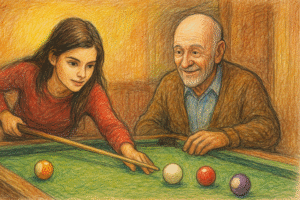There was once an emperor who summoned all the young men of his kingdom because it was time to find a partner for his daughter. All the young men came and the king told them “I am going to give a different seed to each one of you, after 6 months you will bring me in a pot the plant that has grown and, after examining the results, I will choose the future husband of my daughter.”
So, they all did what the king had said; there was one young man who planted his seed and it did not sprout. Meanwhile, all the other young men in the kingdom would not stop talking about and showing the beautiful plants and flowers they had grown in their pots.
The six months passed and all the young men prepared to parade to the castle with beautiful plants. The one young man was very sad because his seed never grew. He did not even want to go to the palace, however his conscience told him that he should go since the king had said that everyone had to return to the castle, although his embarrassment counseled him not to go.
With his head down and very ashamed, he decided to face reality and went to the palace with his empty pot. All the young men were talking about their plants, and when they saw this young man they laughed, openly mocking him. At that moment, the commotion was interrupted by the entrance of the king, to whom each made their respective sign of reverence while he walked among all the pots admiring the plants.
When the inspection was over, he called his daughter, and among all of the young men, he chose the one who had brought his empty flower pot. Stunned, all were waiting for the explanation of that action. The king said “this is the new heir to the throne and he will marry my daughter, because all of you were given an infertile seed, and all of you tried to deceive me by planting other plants. This young man had the courage to present himself and show his empty pot, being sincere and brave, qualities that a future king must have and that my daughter deserves.”
This little story gives us a lesson about a very important reality in our lives: truthfulness. Unfortunately, our society has been transformed into a society that abhors truth. Today “political correctness” is praised more than truth. I do not want to dwell so much on the lack of sincerity with others, the lack of correspondence between what we think about others and what we say about others, but rather I would like to consider sincerity with ourselves.
Just as the young men in the story did not face their reality and were not sincere about it, many times we do not want to, nor dare to, face our reality: recognizing our limitations, acknowledging our mistakes, recognizing our weaknesses, etc. It is very important to have a correct idea about ourselves in order to grow in our personality. Wanting to “sell” an image of ourselves that does not match with reality is totally harmful to our personality, and of course, harms our growth in holiness.
This attitude implies an infidelity to truth that is not intellectual (ignorance) but rather voluntary. Our will loves “the image of oneself” more than the “truth of oneself”; thus, it is a lack of love for the truth. It is a sin against truth. Sins against truth include not seeking it with ardor (having a lukewarm love for the truth), and also, more seriously, lack of love is a sin that leads us to manipulate the truth by obscuring it, distorting it, despising it, accommodating it to what we want, etc.
In this sense it is very important to work on a virtue that is quite forgotten in our days, which is the virtue of truth[1] or veracity that allows us to show ourselves as we are, by our words as well as by our actions. This virtue makes us love the truth until its last consequences and makes us willing to pay any price in order not to betray it, in imitation of Christ who was condemned to death for being faithful to the Truth.
[1] “In another sense, one can call what someone says true, and according to this, we say that one is “true” because of it. Such truth or veracity is necessarily a virtue.” (S.Th., II-II, 109, 1).





